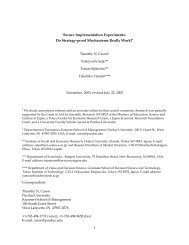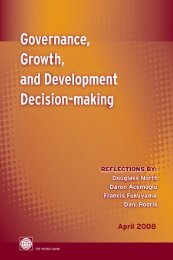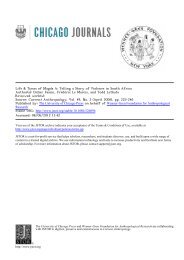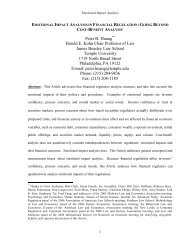Compassion and Repression: The Moral Economy of Immigration ...
Compassion and Repression: The Moral Economy of Immigration ...
Compassion and Repression: The Moral Economy of Immigration ...
You also want an ePaper? Increase the reach of your titles
YUMPU automatically turns print PDFs into web optimized ePapers that Google loves.
IMMIGRATION POLICIES IN FRANCE 373<br />
carrying thous<strong>and</strong>s <strong>of</strong> people every year as they flee countries in Eastern Europe,<br />
Africa, <strong>and</strong> Asia to better their conditions <strong>of</strong> existence. <strong>The</strong> first public reaction<br />
was quite hostile. <strong>The</strong> wreck raised suspicions <strong>of</strong> what many political commentators<br />
described as a “planned” accident that would force France to receive the<br />
ship’s passengers. During the days that followed, the socialist government as well<br />
as its right-wing opponents converged in denouncing the shipwrecked foreigners<br />
as “illegal immigrants” <strong>and</strong> condemning the “criminal organizations” that had<br />
helped them on their way to Europe. This discourse had the effect <strong>of</strong> disqualifying<br />
any claim to political asylum on the part <strong>of</strong> the passengers: they were to be considered<br />
as cl<strong>and</strong>estins (illegal immigrants) rather than possible refugees. Publicly<br />
represented as such, they were parked in a “detention center” without any freedom<br />
<strong>of</strong> movement. Nevertheless, as the television coverage started to show images <strong>of</strong><br />
destitute families, crying children, pregnant women, <strong>and</strong> sick old people behind<br />
barbed wired fences, indignant reactions were provoked from human rights associations<br />
as well as from the media <strong>and</strong> the public. This gave birth to a different<br />
rhetoric. <strong>The</strong>y became “victims” <strong>of</strong> political oppression as well as <strong>of</strong> common<br />
misfortune. Surely, the “homel<strong>and</strong> <strong>of</strong> human rights” would not let them suffer<br />
in what was now referred to as a “camp.” In response to this unexpected wave<br />
<strong>of</strong> collective sympathy, Prime Minister Lionel Jospin declared that each situation<br />
would be examined on the basis <strong>of</strong> “humanitarian criteria.” He did not mention<br />
claims for asylum but instead evoked the sense <strong>of</strong> compassion one needed to have<br />
under such circumstances. As Le Monde commented approvingly: “<strong>The</strong> heart has<br />
its reasons, indeed even its reflexes, to which reason must listen” (2001a). This<br />
approximation <strong>of</strong> Pascal’s aphorism eluded what could be more bluntly cast as the<br />
mere substitution <strong>of</strong> a political right by a moral sentiment. In fact, the residents <strong>of</strong><br />
the “detention center” were relocated to small units dispersed all over the country,<br />
<strong>and</strong> their files were evaluated by the OFPRA, which recognized 83 percent <strong>of</strong> the<br />
claimants as refugees—an exceptionally high proportion in a period when this<br />
institution delivered political asylum to only 12 percent <strong>of</strong> all c<strong>and</strong>idates. National<br />
emotion had indeed benefited them. Moreover, the demographic cost was low,<br />
because only 160 <strong>of</strong> the shipwrecked Kurds ultimately stayed in France, the rest<br />
<strong>of</strong> them preferring to go to other European countries, mainly Germany, where they<br />
had more effective networks.<br />
Following Hannah Arendt’s analysis (1951) <strong>of</strong> “the decline <strong>of</strong> the nation-state<br />
<strong>and</strong> the end <strong>of</strong> human rights,” one can assert that the Geneva Convention was a<br />
response <strong>of</strong> the international community to the neglect <strong>of</strong> the 32 million refugees<br />
<strong>and</strong> stateless people during the 1930s <strong>and</strong> 1940s. However, beyond this ideological<br />
goal were the pragmatic objectives <strong>of</strong> meeting the concrete needs <strong>of</strong> “displaced<br />
persons,” whose number reached seven million immediately after 1945, <strong>and</strong> <strong>of</strong><br />
solving a series <strong>of</strong> demographic <strong>and</strong> economic problems linked to the losses <strong>of</strong><br />
war <strong>and</strong> the requirements for reconstruction. In the case <strong>of</strong> refugees <strong>and</strong> stateless<br />
persons, one should certainly not idealize the conditions <strong>of</strong> the founding <strong>of</strong> a new<br />
world order on the UN’s Universal Declaration <strong>of</strong> Human Rights (Noiriel 1991).<br />
If the “never again” leitmotiv in the wake <strong>of</strong> the Holocaust was a strong incentive
















